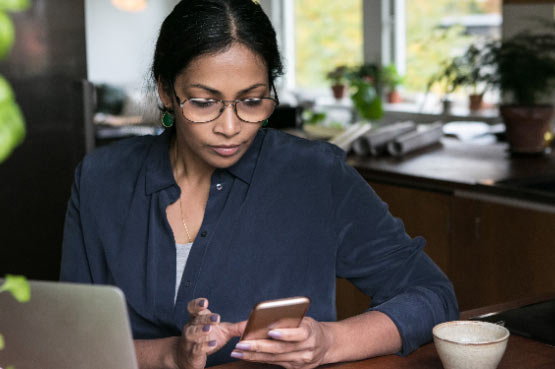How to simplify your life
It’s easy to get overwhelmed with life’s endless to-do lists. And sometimes we might take on too many things at once - especially with social media encouraging us to have it all. But, by making a few simple changes, it’s possible to create more space in your life. Here, I’ll explore how you can simplify your life, for less stress.

Clear out the clutter
Do you sometimes feel calmer, and more able to focus when you are in a clean and organised space? There is some evidence to suggest that a chaotic environment can make it harder for you to concentrate. It may also increase your levels of stress.
To help simplify your life, you could try to create a home environment which is free from clutter. Sometimes, organising your house may feel overwhelming. So try to break it down into manageable sections. You could try to:
- sort one area of your house each week, such as a cupboard or drawer
- turn to paperless bills to cut down on paperwork
- arrange for a charity collection of clothes or furniture that you no longer need
- have a book swap with friends, instead of buying more
Reduce your social media consumption
It’s hard to have a clear mind if you are getting endless notifications, and alerts on your devices. You can find yourself getting drawn into emails or scrolling social media for longer than you had intended. This can make you feel short on time and may distract you from your goals. Social media is designed to keep you hooked. So try these things to help reduce this effect.
- Turn off non-essential notifications. You could choose to log into social media platforms at set times, instead of being interrupted by alerts multiple times a day.
- Unsubscribe from mailing lists. This can help you to reduce the number of unhelpful emails in your inbox. It can free up some mental space too.
- Choose to read a good book instead of using your devices when you are bored or want a break from work.
Create a healthy morning routine
Feeling rushed in the morning can increase your stress levels. Instead, you could try to create a simple and healthy morning routine. This can help you to take back some control over your time. It can help you to get healthier too. You might like to spend a few minutes organising yourself the evening before. This could include laying out your outfit for the day, including any sports clothes you will need. You could also make a healthy ‘grab and go’ breakfast, and make sure your bag is packed. Below are some other ideas for a calm morning.
- Try a morning meditation. Spending just 5 to 10 minutes sitting quietly, focusing on your breath can help you to create some much needed headspace.
- Do a short yoga practice. Yoga can help to bring you into the present moment and can reduce mental overwhelm or burn out.
- Mindful eating. Try to really taste the flavours of your breakfast and notice the different textures. Eating slower can help your digestion. Mindful eating can also help you to slow down and enjoy your food more.
Choose your priorities
When you try to do lots of different things at once it can be exhausting and unsuccessful. Making a few smaller goals is likely to work better.
Try to choose your areas of focus for the next couple of months – these could be health and finances, or maybe family and hobbies. Then within these areas you can make SMART goals. This means they are specific, measurable, achievable, relevant, and timely. For example, you could decide to make one new healthy recipe a week or ring a friend every Saturday morning for a good chat.
Another way to stop feeling overwhelmed is to try and turn your goals into habits. This means your goals start becoming things you do automatically, without you having to remember to do them. It can help to link a new goal to a behaviour you already do often. So, you could:
- do a few squats while the kettle boils
- practice standing on one leg when you clean your teeth (to improve your balance)
- try deep breathing on the train or bus
Before long you will be doing these things regularly. This will help you to meet your bigger goals, without adding to your to do list.
Our health insurance allows you to skip a GP referral in some cases, and speak to a mental health practitioner. Learn more today.
-
Sources Sources
- Online mental health. Mind UK. www.mind.org.uk, accessed 16 January 2023.
- Roster C. The dark side of home: Assessing possession clutter on subjective wellbeing. Journal of environmental psychology. 2016;46. https://doi.org/10.1016/j.jenvp.2016.03.003.
- Personal correspondence with Fatmata Kamara, Mental Health Nurse Global Case Manager, Bupa, January 2023.
- Wolfers L. Social media use, stress, and coping. Current opinion in psychology. 2022;45. https://doi.org/10.1016/j.copsyc.2022.101305.
- Mindfulness. Mind UK. www.mind.org.uk, accessed 16 January 2023.
- Cocchiara R, Peruzzo M, Mannocci A et al. The use of yoga to manage stress and burn out in healthcare workers: A systematic review. J Clin Med. 2019; 8(3): 284. doi: 10.3390/jcm8030284.
- Mindful eating. British Dietitians association. www.bda.uk.com, accessed 16 January 2023. https://www.bda.uk.com/resource/mindful-eating.html.
About our health information
At Bupa we produce a wealth of free health information for you and your family. This is because we believe that trustworthy information is essential in helping you make better decisions about your health and wellbeing.
Our information has been awarded the PIF TICK for trustworthy health information. It also follows the principles of the The Information Standard.

More mental health and wellbeing articles
Did you find our advice helpful?
We’d love to hear what you think. Our short survey takes just a few minutes to complete and helps us to keep improving our healthy lifestyle articles.
Legal disclaimer
This information was published by Bupa's Health Content Team and is based on reputable sources of medical evidence. It has been reviewed by appropriate medical or clinical professionals and deemed accurate on the date of review. Photos are only for illustrative purposes and do not reflect every presentation of a condition.
Any information about a treatment or procedure is generic, and does not necessarily describe that treatment or procedure as delivered by Bupa or its associated providers.
The information contained on this page and in any third party websites referred to on this page is not intended nor implied to be a substitute for professional medical advice nor is it intended to be for medical diagnosis or treatment. Third party websites are not owned or controlled by Bupa and any individual may be able to access and post messages on them. Bupa is not responsible for the content or availability of these third party websites. We do not accept advertising on this page.







